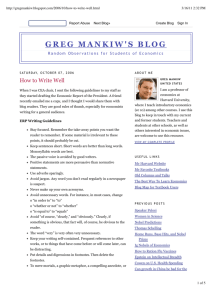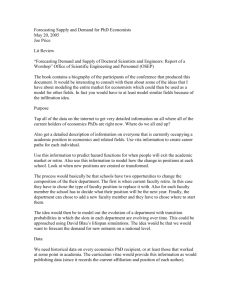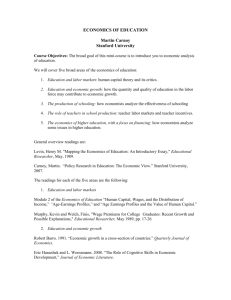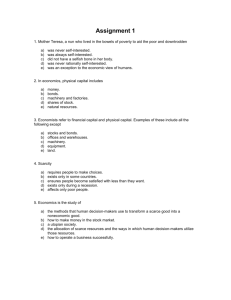Lecture Notes for Economics 435: Economics of Resources
advertisement
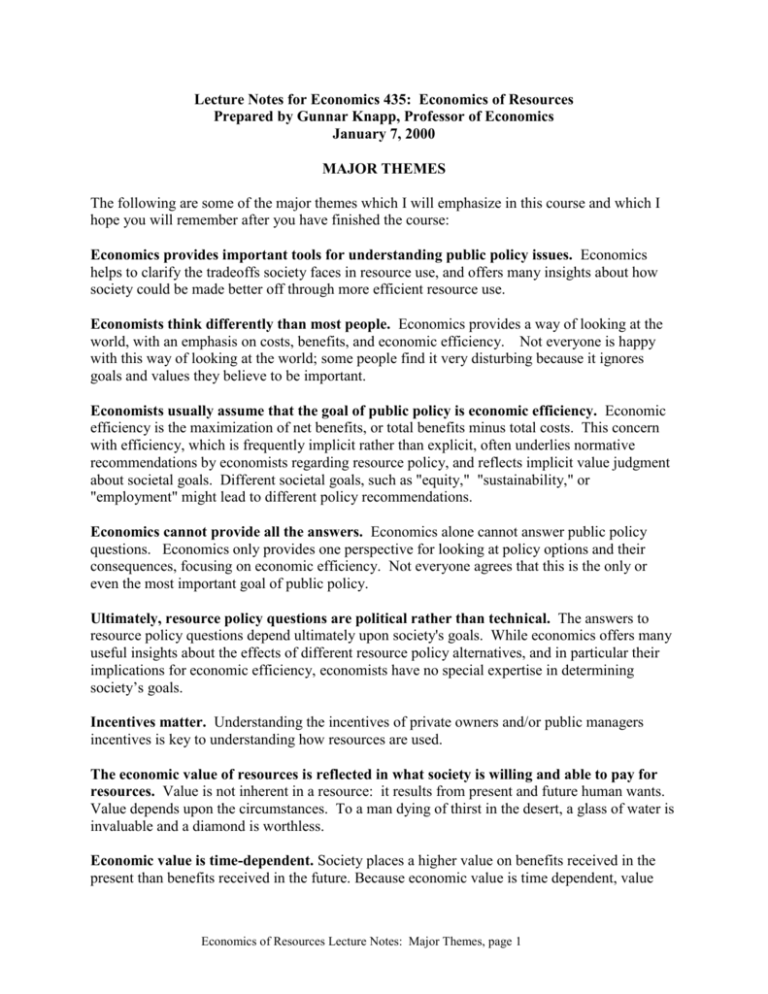
Lecture Notes for Economics 435: Economics of Resources Prepared by Gunnar Knapp, Professor of Economics January 7, 2000 MAJOR THEMES The following are some of the major themes which I will emphasize in this course and which I hope you will remember after you have finished the course: Economics provides important tools for understanding public policy issues. Economics helps to clarify the tradeoffs society faces in resource use, and offers many insights about how society could be made better off through more efficient resource use. Economists think differently than most people. Economics provides a way of looking at the world, with an emphasis on costs, benefits, and economic efficiency. Not everyone is happy with this way of looking at the world; some people find it very disturbing because it ignores goals and values they believe to be important. Economists usually assume that the goal of public policy is economic efficiency. Economic efficiency is the maximization of net benefits, or total benefits minus total costs. This concern with efficiency, which is frequently implicit rather than explicit, often underlies normative recommendations by economists regarding resource policy, and reflects implicit value judgment about societal goals. Different societal goals, such as "equity," "sustainability," or "employment" might lead to different policy recommendations. Economics cannot provide all the answers. Economics alone cannot answer public policy questions. Economics only provides one perspective for looking at policy options and their consequences, focusing on economic efficiency. Not everyone agrees that this is the only or even the most important goal of public policy. Ultimately, resource policy questions are political rather than technical. The answers to resource policy questions depend ultimately upon society's goals. While economics offers many useful insights about the effects of different resource policy alternatives, and in particular their implications for economic efficiency, economists have no special expertise in determining society’s goals. Incentives matter. Understanding the incentives of private owners and/or public managers incentives is key to understanding how resources are used. The economic value of resources is reflected in what society is willing and able to pay for resources. Value is not inherent in a resource: it results from present and future human wants. Value depends upon the circumstances. To a man dying of thirst in the desert, a glass of water is invaluable and a diamond is worthless. Economic value is time-dependent. Society places a higher value on benefits received in the present than benefits received in the future. Because economic value is time dependent, value Economics of Resources Lecture Notes: Major Themes, page 1 must be measured as of a given point in time. Comparisons of costs and benefits must account for when the costs are incurred and when the benefits are received. Mainstream resource economists argue that the goal is not physical production: it is net benefits. If we assume that the goal is economic efficiency, then more isn't necessarily better, and most isn't necessarily best. The maximum feasible level of resource production is not necessarily the optimal level of resource production. Efficiency depends upon both benefits and costs. It may be possible to increase production of food, fish, oil, timber, or clean air. But whether or not it is desirable depends upon whether the benefits from the increased production exceed the costs. Mainstream resource economists argue that waste should not be thought of as a physical concept, but rather an economic concept. Not recycling newspapers, or letting some food crops go unharvested, is not necessarily waste. It is wasteful only if the benefits from recycling the newspapers or harvesting the crops exceed the costs. Mainstream resource economists argue that markets can work. Market incentives can lead to wise resource use--if allowed to operate. Mainstream resource economists argue that many resource problems--including environmental problems--do not arise because of the market system, but rather because of the absence of clearly defined property rights which would allow a market system to send the correct signals about resource use. Resource property rights are fundamental to understanding resource management and the allocation of costs and benefits. Property rights--the bundle of rights to use and benefit from a resource, and the limitations on them imposed by government management--are critical to understanding how resources are used and who benefits from their use. How resource property rights are created and distributed is of critical importance in determining who benefits from the resource over time. Creation of property rights should be undertaken with the utmost care. Who gets the rights can determine who benefits from resources not only in the present, but also in the future. Allocation matters. The allocation of resource benefits is fundamental to resource public policy issues. Economists who ignore the allocational implications of resource policy recommendations risk irrelevancy. Resource value--as measured by the sum of individuals' willingness to pay--is critically affected by the distribution of wealth and income in society. Economists usually assume the distribution of wealth and income as given. In making normative recommendations, economists ought to carefully consider how this assumption has affected their conclusions. Society has a remarkable capacity to adjust to changing resource conditions, if market mechanisms are allowed to operate. Few resources are essential. Resource shortages tend to bear the seeds of their own cure, if they are allowed to be reflected in increasing prices for the resource. The longer the time period, the greater the potential for society to adjust through substitution of inputs, substitution of outputs, and technological changes. Economics of Resources Lecture Notes: Major Themes, page 2 Economics of Resources Lecture Notes: Major Themes, page 3


